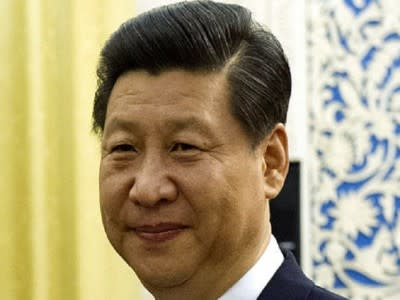China official newspaper slams the U.S. Constitution as undemocratic
An official newspaper of China’s government says the U.S. Constitution doesn’t promote democracy and freedom, even as that nation is trying to clamp down on a debate about China’s own constitution.
Xi Jinping
The South China Morning Post, based in Hong Kong, has been tracking recent editorials in the overseas edition of the People’s Daily, which is a state-run newspaper of China’s government.
And the talk from Beijng sounds more like a professional wresting “body slam” of the U.S. Constitution.
On Monday, a front-page editorial in the overseas edition of People’s Daily said the United States was using “constitutionalism” as a weapon against countries like China. It also credited constitutionalism with destroying the former Soviet Union.
In a second editorial on Tuesday, the Morning Post said a People’s Daily writer named Ma Zhongcheng, who also wrote the Monday commentary, said the U.S. Constitution was just a tool used to exploit people.
“American constitutional governance is more in name than in reality”, said Ma Zhongcheng, who added that “there is no such thing as democracy and freedom under U.S. constitutional governance.” Ma Zhongcheng also added that constitutional governance in the United States was “non-existent.”
The Morning Post also reported that a pro-constitution article ran on Monday in another government-run newspaper, which could be a sign of a fractious debate within China’s political and social circles about its own constitution.
That editorial called for “democratic reform” and expanded political rights for citizens.
The rift in the government’s publications could reflect a divide within China’s ruling elite between conservatives and liberals.
In December 2012, new Chinese leader Xi Jinping issued a statement that was relayed quickly on China’s social media networks about the importance of China’s constitution and the rule of law.
“No organization or individual has the privilege to overstep the Constitution and the law, and any violation of the Constitution and the law must be investigated,” Xi Jinping said on the 30th anniversary of China’s current constitution.
The controversy has been stewing since then, as users of Weibo, a Twitter-like social media network, have openly debated constitutional issues.
The Washington Post said in June that it checked the use of the word “constitutionalism” and found 7 million occurrences. Within days, 5 million occurrences had been deleted by China’s Internet censors.
A Chinese micro blogger also published a list of seven terms called the “Seven Don’t Speaks” that can’t be mentioned at schools, which are constitution-related. The list was saved before it was deleted by censors, but it includes banned terms like “freedom of speech,” “judicial independence,” and “civil rights.”
China’s Ministry of Education is also reportedly monitoring the online communications of teachers to make sure such terms aren’t used to “harm the national interest.”
The China Media Project at the University of Hong Kong also reported in May on the list of “Seven Don’t Speaks” and movements within the Communist Party to clamp down on Western ideals that partially reflect the U.S. Constitution.
It also listed several signs that the Chinese government would do more to monitor and contain the debate about these issues on the Internet.
One account, which was briefly published on a municipality’s web site in southwestern China, listed party directives for containing free speech and other Western ideas.
“Strengthen management of the Internet, enhance guidance of opinion, purify the environment on the Internet, give no opportunities that lawless elements can seize on,” the directive said before it was deleted by the website.
China’s current constitution has provisions that guarantee a representative legislature; freedoms of speech, press and assembly; and human rights.
But the apparent concern among Chinese leadership could be the effect of the concept of constitutionalism on Xi Jinping’s “Chinese Dream” by forcing the nation’s leaders to discuss China’s own constitution, which shares some very core values with its American equivalent.
Recent Constitution Daily Stories
Obama defends surveillance programs on Leno show
Gluten-free product labeling and the First Amendment
Outrage simmers on 48th anniversary of the Voting Rights Act
“The Butler” features Oprah, Presidents and the Voting Rights Act


